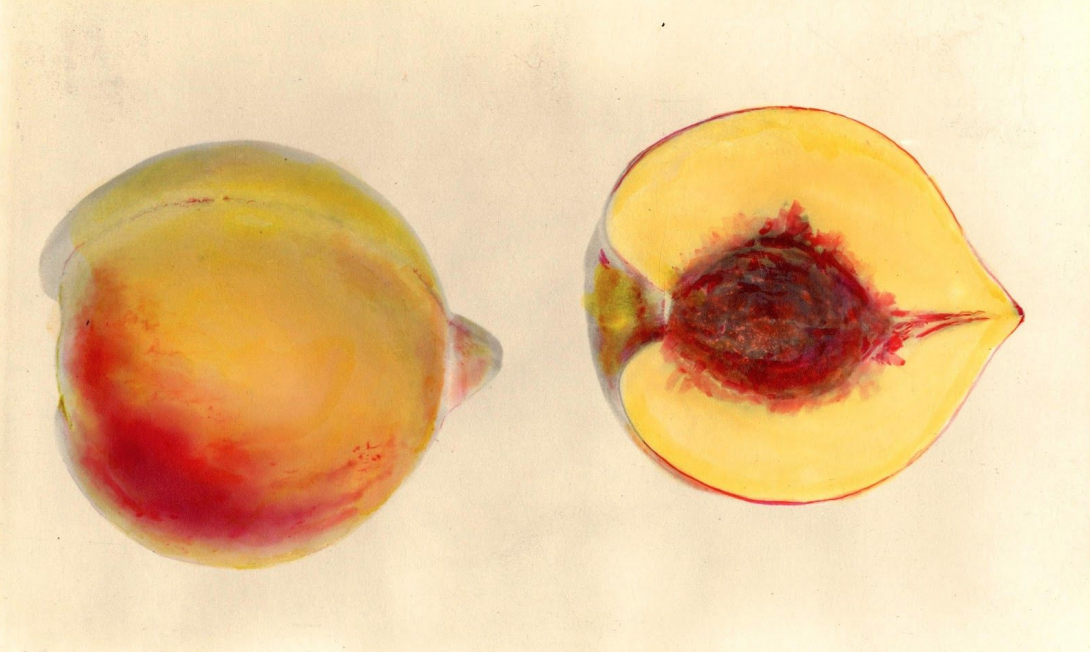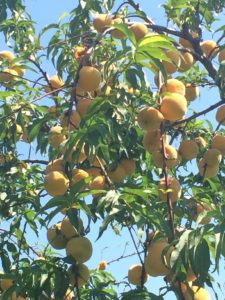By Michelle DiMuzio, Communications Coordinator

In 2017, Slow Food Charleston embarked on an Ark of Taste project to preserve the iconic Lemon Cling Peach. As described by Timothy Matlack, a brewer and leader of the American Revolutionary War, to Thomas Jefferson, the Lemon Cling Peach is “the most juicy and highest flavored of all the Clingstone peaches.” While this peach was originally sought for Brandy-making in the 18th century, it quickly became a standard stock item in American commercial nurseries by the beginning of the 19th century. It is believed to have first appeared in Charleston, South Carolina and is among the first native bred peaches to be recognized by the American Pomological Society. The Lemon Cling quickly became a favorite canning peach and remained so well into the twentieth century. However, in the mid-twentieth century, competition from peach growers overseas wiped out the use of the Lemon Cling in the peach canning industry, and it has not been commercially available for over half a century. Its survival currently depends on the work from historical groups such as Thomas Jefferson’s Monticello.
 That’s why Carrie Larson, Board Chair of Slow Food Charleston, and that chapter’s team decided to take on preserving the Lemon Cling as their next major initiative, after a successful Ark of Taste project with the Seashore Black Rye, in partnership with Dr. David Shields. They hit the ground running by forming a committee of board members interested in the project, creating a list of community partners, and working with farmers to identify growing and research partners, as data collection was an important goal of the project.
That’s why Carrie Larson, Board Chair of Slow Food Charleston, and that chapter’s team decided to take on preserving the Lemon Cling as their next major initiative, after a successful Ark of Taste project with the Seashore Black Rye, in partnership with Dr. David Shields. They hit the ground running by forming a committee of board members interested in the project, creating a list of community partners, and working with farmers to identify growing and research partners, as data collection was an important goal of the project.
While the community support was enthusiastic, there were challenges the Slow Food team faced throughout the project. Slow Food Charleston landed a storybook partnership with Thomas Jefferson’s original orchard, Monticello’s South Orchard, who provided the Lovell rootstock grown from seed and grafts for the Lemon Cling trees as well as the Countryside Nurseries in Albemarle County Virginia, who grew the trees on contract. However, in 2018, too-warm conditions affected germination and in 2019, a windstorm wiped out the entirety of the crop.
After some persistence and redirection, the Slow Food Charleston team recommitted with their grower, increasing the order size to account for any unexpected weather conditions. By the end of 2020, they were pleased to receive a call from the growers that over 150 trees had survived and would be ready for distribution in spring of 2021. Carrie and team then worked with partners and the general public to replant the trees throughout the state of South Carolina, with a majority of the trees going to Charleston-area community partners, including the Charleston Parks Conservancy, the Green Heart Project, the Medical University of South Carolina Urban Farm, Fresh Future Farm, and GrowFood Carolina. Once the peaches are ready for harvest, they will be enjoyed by the general public through community and urban gardens, communities facing food access issues through nonprofit partners, and restaurant-goers through chefs highlighting the superior flavor profile of the peach. “The ultimate goal,” shared Carrie, “is that this becomes a peach anyone can buy in the grocery store.”
 Beyond preserving the historic Lemon Cling, Slow Food Charleston participated in this project to uplift the pillars of the Slow Food movement. “For us, the Lemon Cling Peach project is a conduit for bigger conversations about sustainability and biodiversity,” Carrie explained. The chapter also secured grant money for this project to ensure the trees could be distributed at no cost to community members, making them accessible to the general public and other populations, such as senior citizens.
Beyond preserving the historic Lemon Cling, Slow Food Charleston participated in this project to uplift the pillars of the Slow Food movement. “For us, the Lemon Cling Peach project is a conduit for bigger conversations about sustainability and biodiversity,” Carrie explained. The chapter also secured grant money for this project to ensure the trees could be distributed at no cost to community members, making them accessible to the general public and other populations, such as senior citizens.
Carrie was happy to report they have now been connected to growers in South Carolina who can help them grow out the trees in the future, making this a completely local project, better suited for South Carolina growing conditions. This will help reduce some of the issues they faced with viruses and pests along the way.
While this project has been a sometimes challenging labor of love, Slow Food Charleston is pleased with the results and looks forward to tracking data and pursuing more rounds of planting and distributing the Lemon Cling Peach, ensuring its survival and rebirth. “This project provides purpose for our chapter and is a great story to tell,” Carrie shared. “The history of the Lemon Cling Peach really shines through, and for that, we are very proud.”
–
Learn more about Slow Food Charleston on their website.
Find out more about the Ark of Taste program here.
Photo Credit | Monticello’s South Orchard and MUSC Urban Farm


Thank you for sharing Slow Food Charleston’s story. This project has tested our chapter’s creativity and curiosity and we’re thrilled to finally have Lemon Cling Peaches growing in South Carolina!
Another good partner in this effort would be the North American Fruit Explorers, which has a network of nearly 1,000 non-commercial fruit growers throughout the U.S. and Canada. If you’d like to add them as a partner, I’d be happy to provide a contact email.
Where can I buy one to plant in my yard?
I live in graniteville, south carolina.
Where can I purchase this fruit tree?